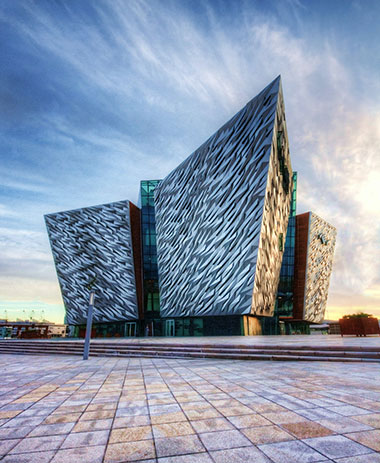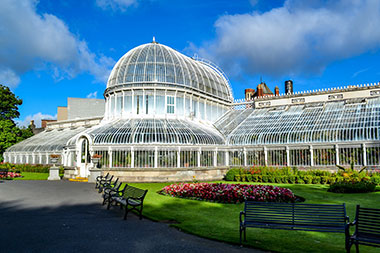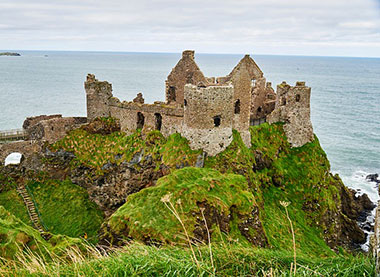Travel > Europe > UK > Northern Ireland Belfast: A City of Resilience and Innovation
Derry: A City of History and Reconciliation
Giant's Causeway
Carrick-a-Rede Rope Bridge
Armagh: City of Saints and Scholars
Enniskillen
Northern Ireland promises an unforgettable journey, where unique culture, magnificent architecture, and stunning scenery unfolds at every turn. Feel the heartbeat of a land steeped in history as you explore ancient wonders and the charm of quaint towns. Discover the warmth of its people and the enchantment of a place that's truly one-of-a-kind. Best time to visitThe ideal time to explore Northern Ireland is in summer (June to August) when the weather is pleasant, and lush landscapes are in full bloom. This season features outdoor events and festivals in cities like Belfast and Londonderry, making it perfect for enjoying picturesque coastal regions and activities such as hiking and picnicking. Keep in mind that the weather can be unpredictable, so bring rain gear. Spring and Autumn are also enjoyable times to visi.Spring (Late March to early June): Average Temperatures: 48°F (9°C) to 64°F (18°C) Spring is a fantastic time to visit Northern Ireland, featuring mild weather and blooming flora. The days are becoming longer and warmer, all while avoiding the peak crowds. Summer (June to August): 66°F (19°C) to 77°F (25°C ) Summer is the prime tourist season in Northern Ireland, offering lengthy daylight hours and warm temperatures. Nevertheless, it tends to be the busiest and most expensive time for a visit. Autumn (September to November): 54°F (12°C) to 64°F (18°C) Autumn presents a stunning opportunity to explore Northern Ireland, with the changing leaves and cooler weather. The crowds have diminished, and prices are generally more budget-friendly. Winter (December to February): 41°F (5°C) to 48°F (9°C) Wintertime in Northern Ireland can be chilly and damp, but it holds a unique charm. The Christmas markets are open, and the cities are adorned for the holiday season. Travel Planning Tips:Visiting Northern Ireland is an opportunity to embrace another part of the UK. By planning ahead and being mindful of these tips, you can make your trip to the Emerald Isle a truly memorable experiencePlan Ahead: Before your trip to Northern Ireland, research the cities, regions, and attractions you wish to visit. Make a list of must-see places and plan your itinerary accordingly. This will help you make the most of your time and ensure you don't miss out on any key experiences in this beautiful part of the United Kingdom. Cash and Currency: Northern Ireland uses the British Pound (£) just like the rest of the UK. Inform your bank about your travel plans to prevent any issues with your credit or debit cards. Carry some cash, especially for small purchases and in rural areas where card acceptance may be limited. Be aware of tipping customs, as it's customary in restaurants and for services like taxis. Travel Insurance: Ensure that you have comprehensive travel insurance that covers medical expenses, trip cancellation, and any potential emergencies. Review the policy details and know how to access medical assistance if needed. Check Visa Requirements: Depending on your nationality, you may need a visa to enter the UK, including Northern Ireland. Check visa requirements well in advance and apply if necessary. Make sure your passport remains valid for at least six months beyond your planned departure date. Pack Accordingly: Northern Ireland experiences a temperate maritime climate, so pack clothing suitable for the season of your visit. It's a good idea to bring an umbrella and dress in layers so you can adapt to varying conditions, even during the same day. Comfortable walking shoes are essential, as exploring cities and attractions often involves a fair amount of walking. Don't forget to bring a universal power adapter for charging your electronic devices. Local Etiquette: Respect local customs and etiquettes in Northern Ireland. Always queue (stand in line) in an orderly fashion, and be polite in your interactions with locals. When dining in a pub, it's common to order and pay for your food and drinks at the bar. Northern Ireland is known for its friendly and welcoming people, so being courteous and friendly will go a long way in making your trip enjoyable. Local Etiquette: Respect local customs and etiquettes in Northern Ireland. Always queue (stand in line) in an orderly fashion, and be polite in your interactions with locals. When dining in a pub, it's common to order and pay for your food and drinks at the bar. Northern Ireland is known for its friendly and welcoming people, so being courteous and friendly will go a long way in making your trip enjoyable. Accommodations:Hotels: Northern Ireland offers a diverse array of hotels, catering to a wide range of preferences, from luxurious to budget-friendly options. Many hotels in Northern Ireland are sensitive to the needs of older travelers and provide amenities such as elevators, accessible rooms, and on-site dining facilities. It's advisable to inquire about potential senior discounts or special rates when making your hotel reservations. Guesthouses and Bed & Breakfasts: Guesthouses and B&Bs in Northern Ireland provide a warm and intimate lodging experience. These accommodations are often operated by local hosts who offer personalized service and create a cozy atmosphere. Choosing a guesthouse or B& allows retirees to engage with the local community and fully immerse themselves in authentic Northern Irish hospitality. Spa and Wellness Resorts: For those seeking relaxation and wellness-focused getaways, Northern Ireland boasts its own selection of spa and wellness retreats. These establishments offer a variety of rejuvenating treatments, thermal baths, and relaxation facilities. Consider a stay in one of these retreats in picturesque regions like County Antrim, County Fermanagh, or along the Causeway Coastal Route, where you can unwind amidst the natural beauty of Northern Ireland. Transportation:Transportation options in Northern Ireland include a variety of modes to help you get around the region. Here's an overview of some of the transportation options available:Domestic Flights: Northern Ireland has several airports, including Belfast International Airport and George Best Belfast City Airport. These airports offer domestic flights to other parts of the UK and some European destinations. Trains: Northern Ireland has an extensive rail network operated by Translink. You can travel by train to various cities and towns within Northern Ireland and also connect to the rail network in the Republic of Ireland. Buses: Bus services in Northern Ireland are operated by Translink and provide a comprehensive network for both urban and rural areas. You can use Metro buses in Belfast and Ulsterbus services to travel between cities and towns. Rental Cars: Rental cars are readily available from major airports and cities. Companies like Hertz, Avis, Enterprise, and Budget operate in Northern Ireland. Having a rental car allows you to explore more remote areas at your own pace. Remember that in Northern Ireland, driving is on the left side of the road. Cars usually have the steering wheel on the right side so you may need to adjust to this. The road network is well-maintained, including motorways (M-roads) and national routes (N-roads). Be prepared for narrower and winding roads, especially in rural areas. Northern Ireland has many roundabouts, which are common traffic features. Familiarize yourself with roundabout rules and understand the proper lanes to use when approaching and exiting them. Taxis: Taxis are readily available in cities and towns. Belfast, in particular, has a significant number of taxi companies and a well-regulated taxi service whch are generally safe and reliable. Look for licensed taxis with a taxi sign on the roof and a taxi meter inside. Fares are typically based on distance traveled, with additional charges for luggage or late-night rides. Taxis in Ireland typically accept both cash and credit cards. Tipping is customary and often involves rounding up the fare or offering a small additional amount. Public Transportation: In Belfast, the public transportation system includes Metro buses and the Glider bus rapid transit system. These services offer a convenient way to get around the city. Ferries: Northern Ireland is well-connected by sea, with several ferry terminals providing services to and from Great Britain and the Republic of Ireland. Major ports include Belfast, Larne, and Warrenpoint. Cycling: Northern Ireland has a growing network of cycling paths and routes, making it possible to explore the region on two wheels. Belfast, in particular, has invested in cycling infrastructure. Safety Tips:
|
 Titantic Belfast (Museum) Titantic Belfast (Museum)Photo by Steven Hylands / Pexels  Botanic Gardens, Belfast Botanic Gardens, BelfastPhoto by John Nail / Pexels  Dunlunce castle, Bushmills Dunlunce castle, BushmillsPhoto by NakNakNak / Pixabay | |||||||||||||||||||||||||